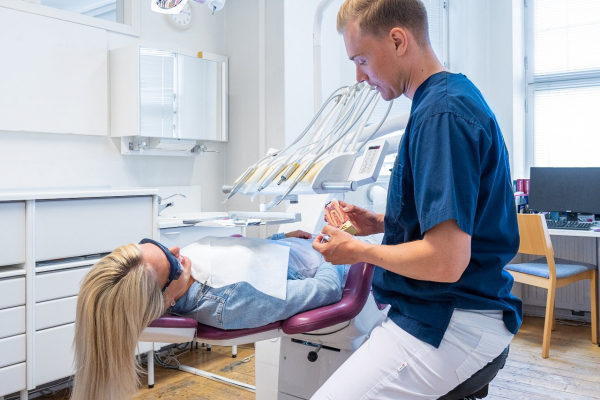Dental cavities and filling

Caries, or tooth decay, is a dental disease that originates from a bacterial infection. Caries bacteria live in the mouth and produce acid from sugars that dissolves tooth enamel. The acid damages the tooth enamel and creates a cavity in the tooth. If the cavity is not filled, it will continue to expand and may even lead to root canal treatment or tooth extraction.
When should you go to the dentist?
Contact your dentist if you have a toothache. Toothache can be momentary and can get worse, for example, when you breathe cold air. In addition, pain may occur when eating hot or cold food. If you suspect cavities in your teeth, or experience aches or sores, it is recommended that you book a dental checkup appointment.
How can dental cavitites be prevented?
Perforation of teeth can be prevented with regular self-care of the teeth and a healthy lifestyle. Your meal rhythm plays a major role in preventing tooth decay. Every meal causes an acid attack in the mouth that the teeth tend to fight. Teeth withstand an average of five to six acid attacks a day. Thus, the rhythm of eating has a significant effect on dental health.
Self-care of the teeth plays an essential role in dental health. Brushing your teeth regularly removes plaque and food debris from your tooth surfaces. It is recommended to brush your teeth daily in the morning and evening for two minutes with an electric toothbrush and fluoride toothpaste. In addition, cleaning the interdental spaces is important to prevent bacteria from forming cavities between teeth.
Dental filling as a procedure
If the caries bacteria has formed a hole in the tooth, it may require dental filling treatment. Dental filling is performed by a dentist. In some cases, good self-care of the teeth can stop the progression of the initial cavities, and the tooth does not require filling treatment. If home care does not work, a filling procedure is necessary.
During the filling procedure, the tooth tissue destroyed by the caries bacteria is removed and the tooth is filled. If necessary, the area is anesthetized. The dentist removes the destroyed tissue with a turbine drill and hand instruments. The area to be filled should be kept as dry as possible during the procedure to make the filling on the tooth as durable as possible.
After removal of the tooth tissue destroyed by the bacteria, the tooth is dried and treated with appropriate substances. The cavity, i.e. the cleaned hole to be filled, is filled with filling material. The most commonly used combination plastic filling material is cured on the tooth surface with blue light. After curing, the area is filed and polished. Finally, the dentist will check the bite so that the filling built into the tooth does not feel high and cause problems with the bite.
After the dental filling
After a dental filling procedure, you should wait until the effect of the anesthetic has stopped so that you do not accidentally bite your cheek or lip. The duration of anesthesia varies slightly, but numbness normally disappears within 2-4 hours of getting the numbing. Otherwise, normal life can be resumed after the tooth has been repaired. After filling, you can play sports and go to the sauna normally. Your dentist will give you individual instructions on how to proceed after the treatment.
Materials used in dental fillings
The most common material used in tooth filling is combination plastic. Teeth can also be patched with other materials. Ceramic materials, amalgam, and gold spots are also common materials used in dental fillings.
Expenses of dental filling
Cavities of different sizes get filled in the teeth. Each tooth is divided into different surfaces, so the cost of a tooth patch varies slightly depending on the size of the filling. The cost of filling depends on how many surfaces on the tooth need to be patched.